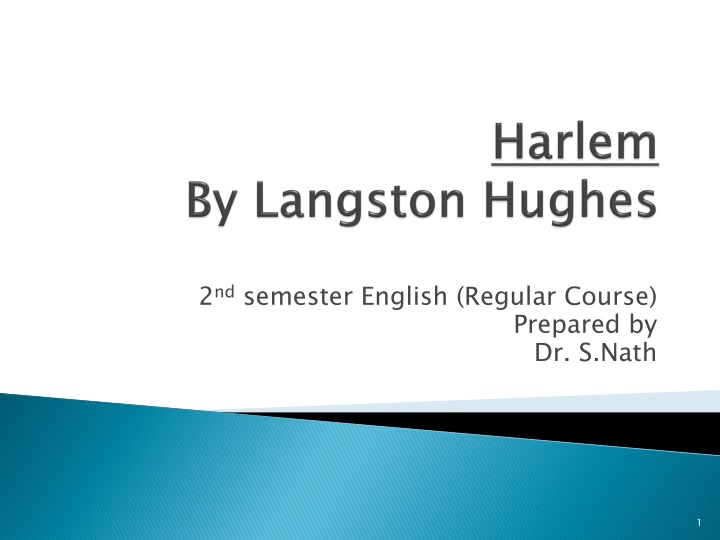
Exploring Langston Hughes' Poem Harlem and Its Deeper Meaning
Delve into Langston Hughes' renowned poem Harlem, which reflects on the deferred dreams of African Americans in the USA. Through vivid imagery and rhetorical language, Hughes explores the consequences of unfulfilled aspirations, likening them to dried-up raisins and festering sores. Discover the social commentary and powerful message embedded in this literary work.
Download Presentation

Please find below an Image/Link to download the presentation.
The content on the website is provided AS IS for your information and personal use only. It may not be sold, licensed, or shared on other websites without obtaining consent from the author. If you encounter any issues during the download, it is possible that the publisher has removed the file from their server.
You are allowed to download the files provided on this website for personal or commercial use, subject to the condition that they are used lawfully. All files are the property of their respective owners.
The content on the website is provided AS IS for your information and personal use only. It may not be sold, licensed, or shared on other websites without obtaining consent from the author.
E N D
Presentation Transcript
2ndsemester English (Regular Course) Prepared by Dr. S.Nath 1
Langston Hughes ( 1901-1967) was an American poet, social activist, playwright, novelist and columnist. He was a central figure in the Harlem Renaissance, the flowering of black intellectual, literary, and artistic life that took place in the 1920s particularly Harlem. He sought to honestly portray the frustrations and hardships of working class black lives who were often denied the opportunity of being a part of the American Dream and were victims of racial discrimination in a number of American cities, 2
The poem Harlem numerous poems that relates to the lives of African American people in the USA. The short poem poses questions about the aspirations of a people and the consequences that might arise if those dreams and hopes are deferred. The poet uses a rhetorical language and vivid imagery to express his thoughts. is one of Hughes 3
The first line of the poem poses a large, open question that the following sub questions both answer and extend. The dream in the line refers to the Black American people s dream for equality, liberty and fraternity; for opportunity in the land of prosperity; for a respected life and dignified ethnic identity that they fought for during the Civil Rights Movement The poem explores the social consequences of such deferred dreams. He imagines it drying up, festering, stinking, crusting over, or finally exploding. 4
The rest of the poem presents a series of questions as an alternative answer to what happens to the fate of a dream when it is postponed The first possible answer that the poet gives is that the dream dries up like a raisin. The simile compares the original dream to a grape which was round, juicy, green and fresh but since it was neglected it dried up and shrunk into a raisin. 5
The next alternative that the poet suggest is that of a sore which conveys a sense of infection and pain. The simile compares unfulfilled dreams to a longstanding sore( injury) on the body which gathers pus and becomes infected. A deferred dream is thus like a painful injury that begins to get infected. 6
The next possible answer intensifies the disgust with the suggestion that a deferred dream may also stink, with the smell of rotten meat. The fourth alternative is that it will form a crust like syrup left out, which means it will make a layer of hard covering. The image again connotes waste, neglect and decay. 7
These are the only lines in the poem which is not framed as a question. The image suggests that deferred dreams may sag (bend with heavy load). In other words unfulfilled dreams weigh one down emotionally and physically and remain heavy on them. 8
The poet italicizes the last line to emphasize the larger consequences of deferred dreams The image swoops in at the end of the poem and jostles the reader with its vivid violence The horrifying possibility of deferred dreams could be that it might explode like a bomb, destroying everything around it The poet is suggesting that the explosion of the deferred dream of equality could hit the entire country, not just the African American community. 9
During the time Hughes was writing, slavery had been over for sixty years. But the blacks still faced extreme inequality in the form of racial discrimination, disenfranchisement and racial segregation in America. The dream of equality had been deferred and the message that the poet is trying to give is that when dreams are deferred, there will be unforeseen consequences not only for the dreamers but also for those denying the dream. 10
What happens when dreams are deferred according to the poet? What is the dream that the poet refers to? Discuss Hughes use of imagery in the poem Discuss the theme of the poem Discuss how the poem deals with the black experience in America. How is the idea of dream deferred related to issues of colour and racism in the context of America? 11
